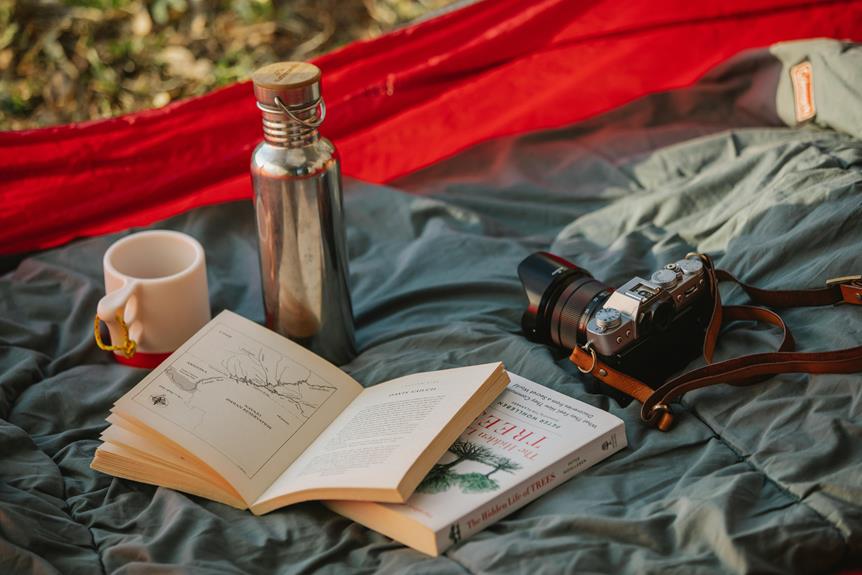
When planning for a camping trip, the balance between packing light and ensuring comfort can be a delicate one. Imagine being able to navigate the great outdoors with ease, enjoying the simplicity of your surroundings while still feeling at home. So, how can you achieve this perfect harmony of minimalism and coziness in your camping gear? Let's explore some practical strategies that will help you streamline your essentials without compromising on comfort, so you can fully immerse yourself in the serenity of nature without unnecessary burdens.
Essential Gear Selection
When packing light for a comfortable camping trip, prioritize selecting essential gear that serves multiple purposes to minimize weight and maximize efficiency. Choose a versatile tent that's lightweight and easy to set up, providing both shelter and protection from the elements. Opt for a sleeping bag that suits various temperatures, eliminating the need for multiple bedding options.
A compact stove with different fuel options can be used for cooking meals and boiling water, reducing the number of items you need to carry. Additionally, a multipurpose tool combining a knife, scissors, can opener, and more will come in handy for various tasks around the campsite.
Consider packing clothing items that can be layered for warmth or removed for cooling down, rather than packing bulky individual pieces for each weather condition. Choose a durable backpack with adjustable straps and compartments to distribute weight evenly and comfortably. Prioritizing essential gear that serves multiple functions won't only lighten your load but also enhance your camping experience by providing convenience and versatility.
Multi-Functional Packing Strategies
Optimize your camping gear selection by employing multi-functional packing strategies that streamline your equipment and enhance your outdoor experience. One effective approach is to choose items that serve more than one purpose. For example, a versatile camping tool like a multi-tool can replace the need for carrying individual knives, scissors, and other tools. Similarly, a portable camping stove that can also function as a small grill can help save space and weight in your backpack.
Consider packing clothing items that can be layered to adapt to changing weather conditions. A waterproof jacket that's also lightweight and breathable can serve as both rain gear and an extra layer for warmth when needed. Additionally, packing items like a bandana that can be used for various purposes such as a sweatband, towel, or makeshift emergency sling can further reduce the number of individual items you need to carry.
Lightweight Clothing and Footwear Choices
To pack light for a comfortable camping trip, consider selecting lightweight clothing and footwear choices that prioritize mobility and versatility. Opt for moisture-wicking and quick-drying fabrics for clothing to help you stay dry and comfortable during various activities. Look for items that can be easily layered to accommodate changing weather conditions without adding bulk to your pack.
Choose versatile pieces like convertible pants that can be worn as shorts or pants, reducing the number of items you need to bring. When it comes to footwear, select lightweight hiking shoes or trail runners that provide support and traction without weighing you down. Consider packing a pair of camp shoes, such as sandals or lightweight slip-ons, for relaxing around the campsite. Remember to pack socks made from moisture-wicking materials to keep your feet dry and prevent blisters.
Minimizing Toiletries and Hygiene Products
Consider streamlining your toiletries and hygiene products to enhance your camping experience with less weight and clutter. Opt for multipurpose items like biodegradable soap that can be used for both body and dishes. Instead of bulky bottles, transfer small amounts of products into travel-sized containers or resealable pouches. Look for solid toiletries such as shampoo bars and toothpaste tablets to eliminate liquid weight. Pack essentials like toothbrush, toothpaste, sunscreen, and insect repellent in minimal quantities. Choose quick-drying microfiber towels that are lightweight and compact.
To further minimize, assess the facilities at your campsite. If there are bathrooms with soap and toilet paper provided, you can leave those items behind. Embrace the natural environment by using unscented products to reduce attracting wildlife. Remember to pack a small trowel for digging a cat hole for human waste disposal. Prioritize hygiene but aim to simplify your routine.
Efficient Food and Cooking Supplies
Streamline your food and cooking supplies to make meal preparation effortless and efficient during your camping trip. Opt for lightweight, non-perishable foods like dehydrated meals, energy bars, and trail mixes. These items are easy to pack, require minimal cooking equipment, and have a long shelf life. Consider pre-measuring ingredients for recipes and storing them in labeled zip-top bags to save space and time when cooking.
Invest in versatile cookware such as a compact camping stove or a lightweight pot that can be used for multiple dishes. Pack essential utensils like a spatula, a sharp knife, and a multitool to handle various cooking tasks without weighing down your bag. To minimize waste, bring reusable containers for storing leftovers and transporting water. Additionally, pack biodegradable soap for washing dishes and utensils in an eco-friendly manner.




